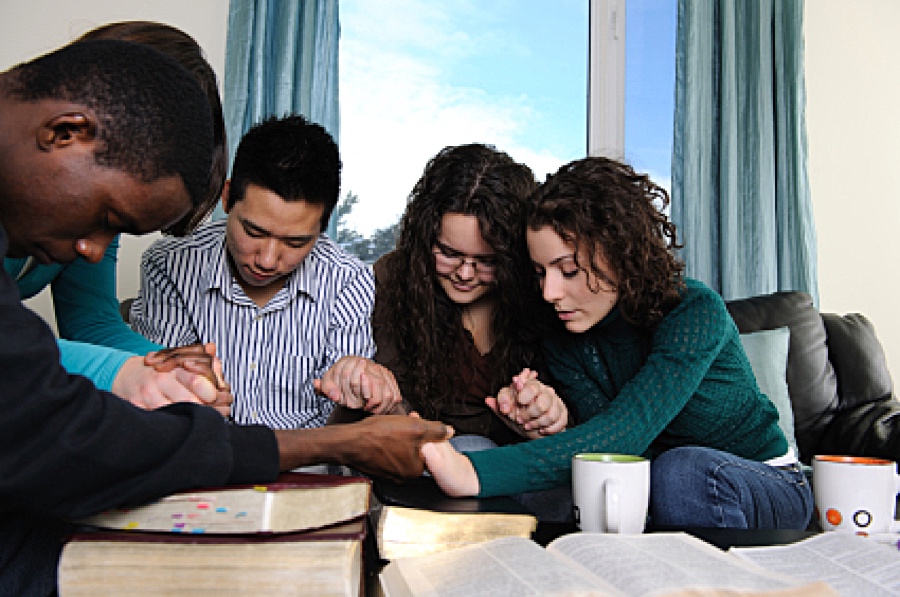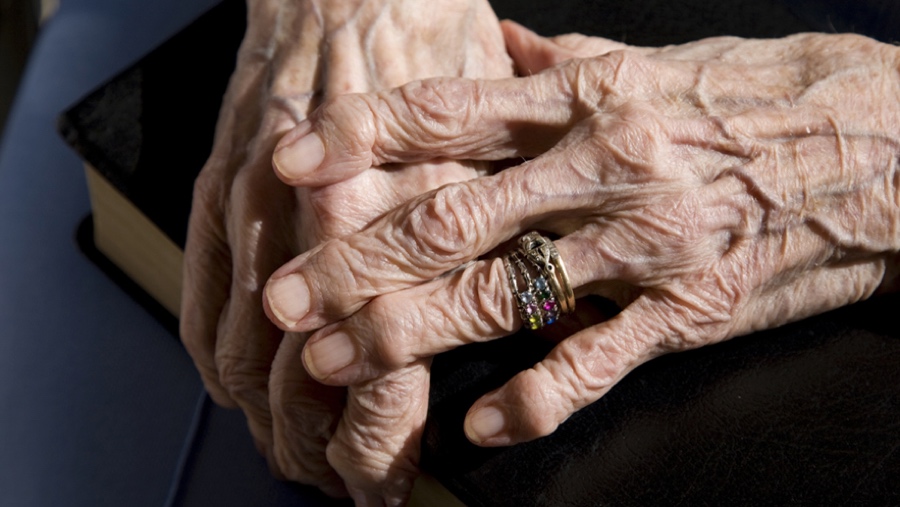Yes, I know that folk proverb can be true. Likewise, most of us who have "searched long and hard" for something precious have also discovered another truth: The treasure can be in the details! Many of life's sweetest discoveries happen because we research carefully, we look exhaustively, and we pay attention to the smallest details.
I have found this principle especially true in Bible study. Some of the Bible's most glorious treasures reveal themselves in the small details in the scriptures. This principle is especially true when we invest some time focusing on genealogies, travel notes, and personal greetings at the beginning and end of the gospels and Paul's letters. These often overlooked sections of our Bibles frequently have unexpected blessings if we will take a closer look at their details. The last chapter of Paul's letter to the Romans has a number of these treasures.
Paul had never visited Rome, yet he addressed 17 men and 10 women,[ONE] including several households, as he closes his letter (Romans 16:1-16). This list reflects the diverse nature of the church family in Rome. Paul championed this diversity. He taught that grace tore down cultural barriers as all people were baptized into Christ:
There is neither Jew nor Gentile, neither slave nor free, nor is there male and female, for you are all one in Christ Jesus (Galatians 3:28).
That Paul mentioned so many people in the church in Rome - in a town that he had never visited - reminds us of the mobile nature of the early church. This interconnectedness of early believers across the Roman Empire also demonstrated their commitment to seek each other out as brothers and sisters while they traveled. When we investigate a little more closely, we discover Paul's interest in these individual people was also tied to his robust prayer life, his intentional maturing of new disciples, along with his concern for "his" churches and the precious people who made up those churches (2 Corinthians 11:28; Colossians 1:28-29; 1 Thessalonians 1:2-3; 5:23-24; 2 Thessalonians 1:11-12; 2:16-17).
The focus of our current series of reflections is on the importance of women in Scripture. This list (Romans 16:1-16) is a powerful reminder of their importance in the life of the early church and celebrated by the apostle Paul. Paying attention to this list, along with other personal tidbits in Paul's other letters, helps us discover many ways that women served, led, and blessed the early church.
Paul's list begins with a note of recommendation for Phoebe to the church in Rome:
I commend to you our sister Phoebe, who is a deacon in the church in Cenchrea. Welcome her in the Lord as one who is worthy of honor among God's people. Help her in whatever she needs, for she has been helpful to many, and especially to me (Romans 16:1-2 NLT).
Paul called Phoebe a deacon in the church in Cenchrae. The natural understanding of Paul's words indicates this servant leader role for Phoebe. She was probably a woman of financial means - a benefactor or special financial supporter of important ministries - who is now coming to the congregations in Rome from Cenchrea. Paul commands these Roman believers to respect her ministry and help her in her ministry efforts in Rome.[ThREE] While I don't know all the ways Phoebe led in ministry and blessed the Lord's people, we have similar examples of other women who were servant leaders in ministry - women like Dorcas in Joppa (Acts 9:36-43) and Lydia in Philippi (Acts 16:13-15, 40). Euodia and Syntyche, also from Philippi, probably also fit into a similar leading ministry role in Philippi (Philippians 4:2-3).
Paul could not have made the importance of Phoebe's previous work in Cenchrae and her future work with the church in Rome more clear. The church was to welcome and support her in her ministry. She is a great reminder of how church practice in modern times in some places has lagged behind the example of the early church.
The next woman on Paul's list (Romans 16:3) was Priscilla (Prisca), whose husband was Aquila. These two early church leaders are found together in various cities. They are repeatedly tied to various aspects of Paul's ministry. Paul considered them his dear co-workers:
Give my greetings to Priscilla and Aquila, my co-workers in the ministry of Christ Jesus. They once risked their lives for me. I am thankful to them, and so are all the Gentile churches. Also give my greetings to the church that meets in their home (Romans 16:3-5 NLT).

This dynamic married couple hosted house churches in Rome (Romans 16:5), Ephesus (1 Corinthians 16:19), and Corinth (Acts 18:3). They accompanied Paul on some of his mission efforts (Acts 18:18). When a dynamic orator named Apollos spoke about Jesus to unbelieving Jews in Ephesus very eloquently, but incompletely and inaccurately, this couple took him aside privately and straightened out his teaching on Jesus (Acts 18:24-26). That Luke and Paul often referred to Priscilla first would suggest that she took the lead in this and other efforts. Both Priscilla and Aquila worked hard with Paul in the work of the gospel. They shared ministry, life, and the common vocation of leather work and tent-making (Acts 18:1-3).
This couple had risked their lives right alongside Paul to share the gospel. Priscilla played a huge role in evangelism, providing a place for the church to meet as well as teaching Apollos the truth about Jesus more completely. Again, the Bible usually refers to Priscilla first when mentioning this couple. This order is significant. Her culture, along with traditional biblical practice, normally listed the man first when referring to a married couple. Her priority in most references suggests that she took the lead in the ministry efforts that she shared with her husband.
That Priscilla partnered in ministry with her husband, Aquila, does not negate or minimize her importance to the life of the church and the work of Paul. Her work was vital to congregations. Her ministry was important to evangelism. Her work in hosting the churches was essential to church growth in three leading cities in the ancient world. Each of these roles shows the widespread influence that Priscilla had along with her husband in blessing the early church.
Phoebe and Priscilla are just the first two of ten women we find in Romans 16. These women served all sorts of roles. Some were imprisoned with Paul because of their work in evangelism. Some were dear to Paul personally because of their ministry to him. One was known as an apostle, an early person of faith. Each was invaluable to the work of Jesus. All of this we know because these treasures are right there for us to find in the details!

I encourage you to read Paul's list in several translations. Get a feel for how important their work, service, ministry, support, leadership, sacrifice, and encouragement were to Paul and the early church. Also, notice the roles and the value of these roles that Paul assigned to them. What follows are the verses with each woman's key work or achievement in bold print and their names underlined:
Greet my dear friend Epenetus. He was the first person from the province of Asia to become a follower of Christ. Give my greetings to Mary, who has worked so hard for your benefit. Greet Andronicus and Junia, my fellow Jews, who were in prison with me. They are highly respected among the apostles and became followers of Christ before I did. Greet Ampliatus, my dear friend in the Lord. Greet Urbanus, our co-worker in Christ, and my dear friend Stachys.
Greet Apelles, a good man whom Christ approves. And give my greetings to the believers from the household of Aristobulus. Greet Herodion, my fellow Jew. Greet the Lord's people from the household of Narcissus. Give my greetings to Tryphena and Tryphosa, the Lord's workers, and to dear Persis, who has worked so hard for the Lord. Greet Rufus, whom the Lord picked out to be his very own; and also his dear mother, who has been a mother to me.
Give my greetings to Asyncritus, Phlegon, Hermes, Patrobas, Hermas, and the brothers and sisters* who meet with them. Give my greetings to Philologus, Julia, Nereus and his sister, and to Olympas and all the believers who meet with them. Greet each other in Christian love. All the churches of Christ send you their greetings (Romans 16:5-16 NLT).
As we have seen in previous weeks, women were instrumental in supporting the ministry of Jesus. They were faithful to be present with him through the Passion when the male disciples were not. We also find these women praying for the coming of the Holy Spirit and present at Pentecost. They played important roles in the evangelization of Macedonia. They were vital in providing churches and missionaries places to meet. They were partners in ministry with the apostle Paul.
Many of these women, as Paul's list (Romans 16:1-16) indicates, worked hard for the Lord and his people. They served in recognized roles with titles and responsibilities and as behind-the-scenes servants. While we may not know everything that each of their ministries entailed, we do know that Paul felt their work was significant enough to include in his letter that was read aloud in the church assemblies in Rome. We must not discount or forget that these are roles, titles, and ministries in which these women led and served with the blessing of Paul, the apostle. Let's appreciate and involve women in similar ways today, valuing them as gifted servants of Jesus, partners in ministry, and essential leaders in servant ministry to the church and the world.

[ONE] This list of names helps identify the ten women based on the feminine endings for their names: Phoebe, Priscilla (Prisca), Mary, Junia, Tryphena, Tryphosa, Persis, Rufus' mother, Julia, and Nereus' sister.
[TWO] Here are the current articles in our series:
- Of Sacred Value Women played invaluable roles in Paul's ministry and in the life of the early church.
- Made to Be Complements
- Restoring the Creator's Intent
- Our New Trajectory in Pentecost
- Important Women, Important Roles
- Co-Heirs with Christ
- Too Familiar to Feel the Bite
- Unconventional Grace and the Song of Jesus
- The Women
- The Macedonian Connection
[THREE] For a few today, some lingering debate remains over whether or not Phoebe was an official "deacon" or a regular "servant" leader in the church at Cenchrea. After all, the word "deacon" (1 Timothy 3:8) and "servant" (Matthew 23:11) and "minister" (2 Corinthians 3:6) are the same word in the original Greek - diakonos. This word refers to a simple table servant or household servant in common usage and always carries the connotation of servant wherever it is found. Early English translators did not translate the word servant, but transliterated it - they gave a sound equivalent instead of an equivalent term in English. Some of the first recognized servant leaders in the early church were appointed to take care of feeding the neglected widows in Jerusalem (Acts 6:1-7), the term appears to have gained an important distinction for those who serve those in need in some special way. By the time Paul wrote 1 Timothy 3 and Titus 1, the sense of a recognized servant to the congregation had a clear importance and responsibility. Paul made clear that there was a certain character needed to serve in this role whether these servant leaders ("deacons") were men or women (1 Timothy 3:8-13). Paul refers specifically to these kinds of special servants who functioned as servant leaders in Philippians 1:1.
Several insights are important as we look at Phoebe's role and importance to the churches of Cenchrea and Rome:
- The New Testament did not have a separate "religious" word like today's word deacon.[THREE] The Greek word sometimes transliterated "deacon," diakonos to sound like the original word, really meant "table servant." This word probably would be best translated "servant leader" most places it is found in the New Testament. Jesus used this term to describe his leadership (Luke 22:24-26; Matthew 23:11). Paul pointed early Christians to Jesus as the supreme example of this kind of true leadership (Philippians 2:5-11). As students of the scriptures, we have to determine the best term to use to translate diakonos into English based largely on context. But, we must be careful not to change the meaning of the term and role simply because of the gender of the person described, especially when the New Testament does not do this. Just because the first list of those who served in a similar role were men (Acts 6:1-7), doesn't mean we can ignore the women who are mentioned in similar roles. In Jewish cultures near Jerusalem, only men were allowed to serve in such roles. However, as the Christian movement expanded and women had greater freedoms, we find them taking on increasingly important roles as we see in Macedonia (Acts 16:13-15, 40; Acts 17:4, 12; Philippians 4:2-3) and Rome (Romans 16:1-16).
- The language used for Phoebe describes her in a leading servant role in her congregation - "a servant of the church at Cenchrae" (Romans 16:1 ESV). The way the church in Rome was commanded by Paul to "help her in whatever she may need (require) from you..." (Romans 16:2 ESV) also supports this understanding for her role in Rome. (If Phoebe's name had been Philip, there would be no doubt about her role as a "deacon" because she is identified with a specific congregation - compare Philippians 1:1.) She may have served as a patron or benefactor providing funds and resources for the early church (Romans 16:1 NIV), similar to the women who supported Jesus (Luke 8:1-3) and like Lydia who provided for the church and the mission team in Philippi (Acts 16:11-15, 40). Or, she could have had a ministry like Dorcas who did much good and helped the poor (Acts 9:36-43). She may have had a key role in evangelizing people in Cenchrae similar to what Euodia and Syntyche had done in Philippi (Philippians 4:2-3). Determining her exact role is not the significant point. The significant point is that Phoebe was recognized in two different sets of churches as someone integral to the church's ministry, as well as someone who should be welcomed, followed, and supported in her good work for the kingdom of God (Romans 16:2). She is but one of several women in recognized roles in the ministry of Jesus and the early church - like the women who supported Jesus or Lydia, Euodia, Syntyche, and Dorcas.
- That there are qualifications for "the women" who served in the role of "deacon" or "leading servant" in Ephesus (1 Timothy 3:11) indicates that this role for women was recognized in Ephesus as well as Cenchrae and Rome and was supported by the apostle Paul in all three places. Some today still have problems with women having qualifications for serving as a "deacon" because some translations chose to interpret the reference to "the women" as "their wives." As the footnote of nearly every responsible Bible translation suggests, the translation of "the women" as "their wives" (1 Timothy 3:11 ESV) is an interpretation rather than a translation. The word "wife" is not used (1 Timothy 3:11 NLT). The literal wording is "women likewise..." Since there are no corresponding character attributes required for the "the women" who are married to elders, then these requirements for the wives of male "deacons" seems out of place. The simplest understanding, and the one accepted by many conservative scholars today, is that Paul was giving the character attributes for women who served as "deacons." Notice two realities that support this understanding. First, Paul gives qualifications for widows who served and were supported by the church in 1 Timothy 5:3-16, so we know that women did serve in some forms of ministry. Second, we have the example of Phoebe who is called a "deacon" (Romans 16:1-2). Paul's language clearly implies that Phoebe served the congregation in Cenchrae in an accepted and official leadership role. Paul also gave instructions on how the church in Rome was to receive and support her in a similar role. Notice the language of the New Living Translation which carefully translates these terms:
I commend to you our sister Phoebe, who is a deacon in the church in Cenchrea. Welcome her in the Lord as one who is worthy of honor among God's people. Help her in whatever she needs, for she has been helpful to many, and especially to me (Romans 16:1-2 NLT).
- Two truths about Phoebe cannot be doubted:
- She was invaluable to Paul and the congregations with whom she was involved.
- She ministered to and with congregations. Her ministry was not in an out-of-the-way position or a backseat ministry without any authority: in fact, the congregations in Rome were to help her do her ministry.
Special thanks to Free Bible Images for the images used on this page.












Comments
Have thoughts on this article? Leave a comment